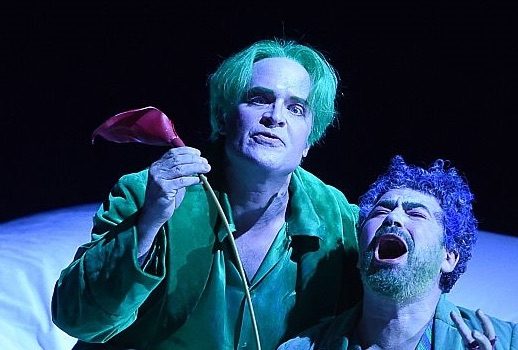
I am a longtime Britten fan, having been exposed to a black-and-white telecast of Peter Grimes in the 1960s, and can remember the premiere of Owen Wingrave, an opera written specifically for television (which I find to be a vastly underrated work now that I’ve had the opportunity to see it staged). So how is it that it took me so long to discover the innumerable joys of A Midsummer Night’s Dream?
Despite what Wikipedia says about the opera becoming a virtual instantaneous addition to the standard repertoire (a rather UK-centric view, I dare say), it did not reach the Met till November 1996. The winter of 1996/1997 was a dark time for me personally, so it was easy to overlook the eight performances given to the company’s first production. By the time it was revived, I was no longer living in America.
I first saw the opera at Volksoper Wien in 2002, sung in German which sort of defeated the purpose, but I fell under the spell of its score on the spot. It also gave me the opportunity to hear the great Jochen Kowalski at the end of his career as a rather shaky Oberon.
When Philippe Arlaud’s wondrous production was revived in 2006, it was finally performed in English, a further revelation for me. The cast featured many young ensemble members who have moved on to international careers (Elisabeth Kuhlman and Daniel Behle among them). But the crowning glory was the spoken role of Puck performed by Karl Markovics, a stage and screen actor known throughout the world for his starring role of Sorowitsch in Die Fälscher (The Counterfeiters) which won the 2008 Academy Award for Best Foreign Language Film of the Year.
This week’s performance comes to us from last summer’s Festival d’Aix-en-Provence which includes in its cast Lawrence Zazzo, Sandrine Piau, Leyla Claire, Brindley Sherratt, and as Puck the actor Miltos Yerolemou, whose résumé includes roles in Game of Thrones and the most recent Star Wars film.
If you know Britten only through his most popular operas – Peter Grimes, Billy Budd, and The Turn of the Screw – be prepared for a totally new sound palette, one which features the comic antics of the rude mechanicals (including the drag role – written for Pears – of Thisbe, who gets to sing a parody of a Donizetti mad scene), and the most sensuous, gorgeous music Britten ever wrote, for the four mismatched lovers.
So, good night unto you all. Give me your hands, if we be friends, and Jungfer Marianne shall restore amends!
Benjamin Britten: A Midsummer Night’s Dream
Trinity Boys’ Choir
Orchestre de l’Opéra National de Lyon
Kazushi Ono, conductor
Théâtre de l’Archevêché
Festival d’Aix-en-Provence
07 July 2015
Oberon – Lawrence Zazzo
Tytania – Sandrine Piau
Puck – Miltos Yerolemou
Lysander – Rupert Charlesworth
Demetrius – John Chest
Hermia – Elizabeth DeShong
Helena – Leyla Claire
Thesus – Scott Conner
Hippolyta – Allyson McHardy
Bottom – Brindley Sherratt
Quince – Henry Waddington
Flute – Michael Slattery
Snug – Brian Bannatyne-Scott
Snout – Christopher Gillett
Starveling – Simon Butteriss
Post scriptum: If you missed it, on Thursday I uploaded last week’s opening day performance of Parsifal from Bayreuth. You can find it at https://www.mixcloud.com/Jungfer_Marianne_Leizmetzerin/


